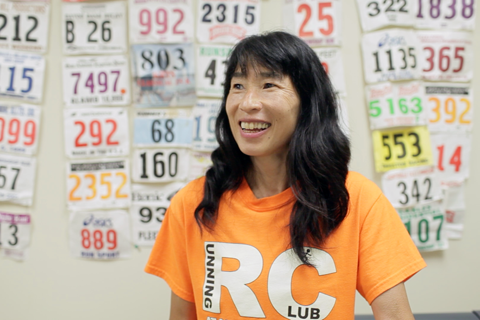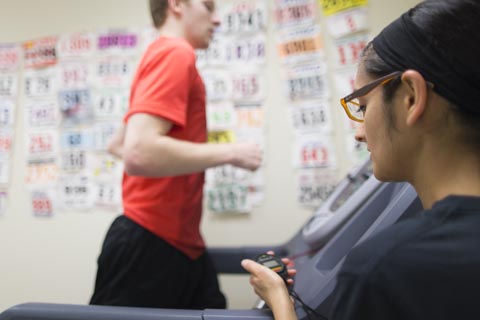
Written by Kelli M. Titus

Assistant professor Dr. Tamara Hew is works with graduate students and student athletes in her exercise science research in the School of Health Sciences' Prevention Research Center. Below, graduate student Neena Silles runs test on Kyle Medley, one of Dr. Hew's research assistants.

In an effort to promote research in exercise science, Oakland University’s Dr. Tamara Hew guides a team of students in studying how prevention measures impact the performance of OU athletes.
“I have a tendency to gravitate towards athletes and runners,” Hew said. “I like to look at the limitations of physiology.”
Assistant Professor Hew enjoys studying human performance and ways to prevent sickness and injuries. This passion is relayed through her research, as she recently collaborated with 90 of Oakland’s athletes in men's and women’s cross country, men's and women’s swimming, women’s volleyball and men’s soccer, testing students from each team to discover the effects that protein supplementation has on the body. Hew assigned six of her students to test the teams.
Exercise Science graduate student Neena Silles works closely with Hew on this research to develop her graduate thesis on the effects of Muscle Milk on body composition, aerobic performance, baseline kidney function and heavy metal concentrations in male swimmers across a single competitive season.
The student athlete data is currently under analysis, but Hew hopes to find that the athletes are gaining adequate nutrition from their diet alone.
In a different study, Hew tested 40 students, both professional and college runners along with non-active students, to explore the effects of the hormone Irisin, which is claimed by scientists to be a cutting-edge weight loss agent. Hew and her team of students and OU faculty trained the group of sedentary students in a series of exercise programs three times a week for 12 weeks, continuously testing their Irisin levels and comparing then to the levels found in the runners. Hew initially found low levels of Irisin in the group of runners, and notices the hormone levels decreasing as the non-active students continue their exercise regimen.
“The data is still being analyzed, but what we may find is this magical new hormone drug is not what we thought,” Hew said. “We trust our data and have worked on it for the past six months in the lab.”
For four years, Hew has taught at OU, where she’s become not only an assistant professor and researcher, but a mentor as well.
“I find mentoring students in research studies the most gratifying,” she said. “It gives them some type of connectedness and purpose. I know that I can make a difference in people’s lives.”